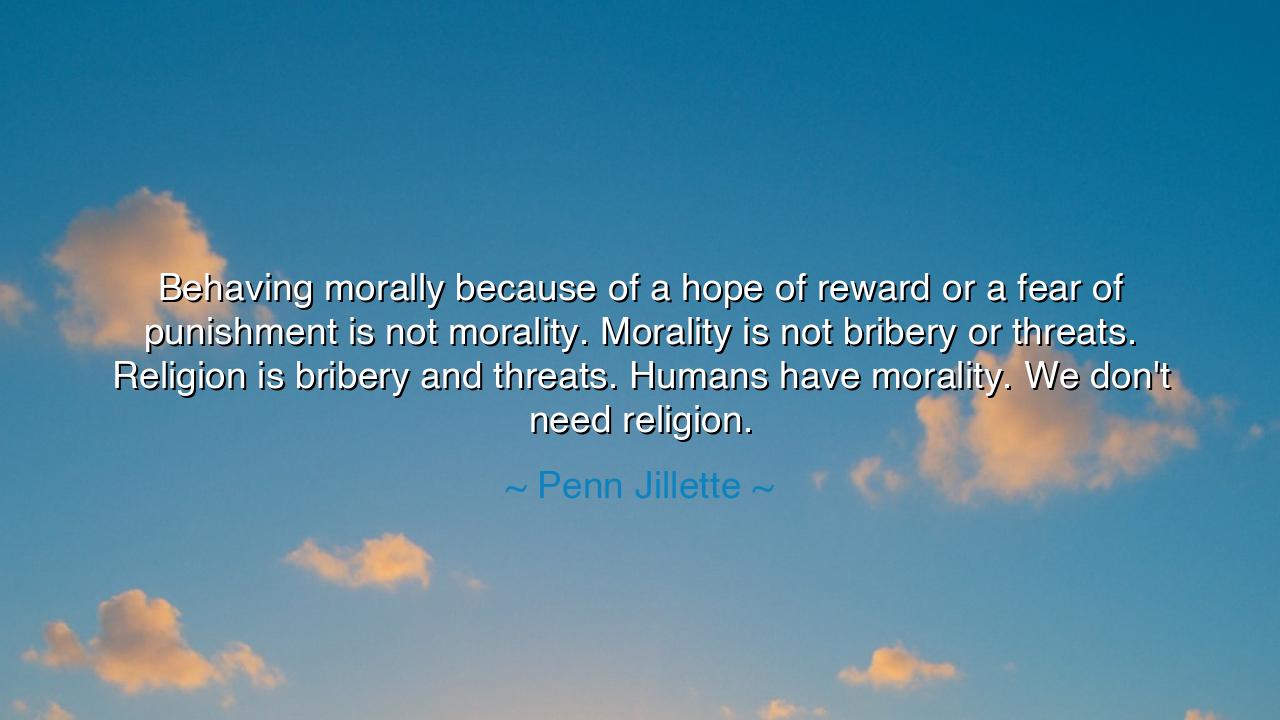
Behaving morally because of a hope of reward or a fear of
Behaving morally because of a hope of reward or a fear of punishment is not morality. Morality is not bribery or threats. Religion is bribery and threats. Humans have morality. We don't need religion.






“Behaving morally because of a hope of reward or a fear of punishment is not morality. Morality is not bribery or threats. Religion is bribery and threats. Humans have morality. We don’t need religion.”
Thus spoke Penn Jillette, a modern voice of reason and rebellion, whose words echo like the challenge of a free spirit against the thrones of dogma. His statement pierces through the veils of centuries, questioning the very foundation upon which men have built temples of fear and obedience. He reminds us that true morality cannot be purchased by promises of heaven, nor compelled by threats of hell—it must rise freely from the human heart, born of empathy, wisdom, and conscience.
The origin of this thought lies in the eternal struggle between faith and reason, between obedience to divine command and responsibility to human conscience. For ages, rulers and priests have used the twin weapons of reward and punishment to govern souls. “Do good,” they said, “and paradise awaits; do evil, and torment shall follow.” But Jillette unmasks this teaching as a kind of moral bribery, where virtue is not love of the good, but calculation of gain. To act justly only for reward is not morality—it is commerce of the spirit. The soul that fears punishment is not pure; it is merely shackled.
Consider the story of Socrates, who stood before the court of Athens, accused of corrupting the youth and defying the gods. He was offered freedom if only he would renounce his truth. Yet he refused, saying that it is better to suffer injustice than to commit it. Socrates sought neither reward nor escape; he obeyed the voice of his inner morality—that sacred compass which no law nor religion can dictate. When he drank the hemlock, he showed that true virtue is guided not by fear, but by love of truth itself. Thus he became immortal, not because he prayed for heaven, but because he lived rightly on earth.
Jillette’s words remind us that morality is human—as ancient as compassion, as deep as reason. It is what makes a mother shield her child, what makes a stranger lift another from the dust, what makes a soldier refuse an unjust command. These acts are not born of doctrine, but of the innate goodness that flows through our shared humanity. Even before prophets walked the earth, even before sacred books were written, morality existed—in the tribe that shared its food, in the elder who taught wisdom, in the hand that healed rather than harmed.
Yet, beware: to deny the need for fear or promise is not to deny the sacred. It is to see that the sacred dwells within, not without. When man discovers that he himself is capable of goodness without chains, he becomes free—and in freedom, his virtue shines truer. The greatest moral act is not obedience, but understanding; not worship, but compassion. For when we act rightly without expectation, we touch the divine in its purest form—the divine that lives in reason, kindness, and love.
Still, this teaching is not an easy path. To live morally without fear of punishment requires courage, and to do good without seeking reward demands strength of soul. But such is the true heroism of the spirit—to act rightly even when no god watches, to be just even when unseen. This is the morality that builds civilizations, not temples; that raises men, not idols. It is the morality of thinkers, artists, and dreamers who trust the light of conscience over the shadow of command.
So remember this, O seeker of wisdom: do good for the sake of good itself. Let compassion be your law, reason your scripture, and conscience your priest. When you act out of love, you need no promise of heaven; when you live by truth, you fear no hell. For morality is not born from religion—it is the foundation upon which all true religion should rest. And when humanity understands this, the world will at last be ruled not by fear or bribes, but by wisdom, freedom, and love.






AAdministratorAdministrator
Welcome, honored guests. Please leave a comment, we will respond soon